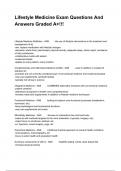Exam (elaborations)
Lifestyle Medicine Exam Questions And Answers Graded A+!!!
- Course
- Institution
Lifestyle Medicine Definition - ANS -the use of lifestyle interventions in the treatment and management of dz -aim: replace medication with lifestyle changes -elements: whole food, plant-based, physical activity, adequate sleep, stress mgmt, avoidance of risky substances -collaborative m...
[Show more]



